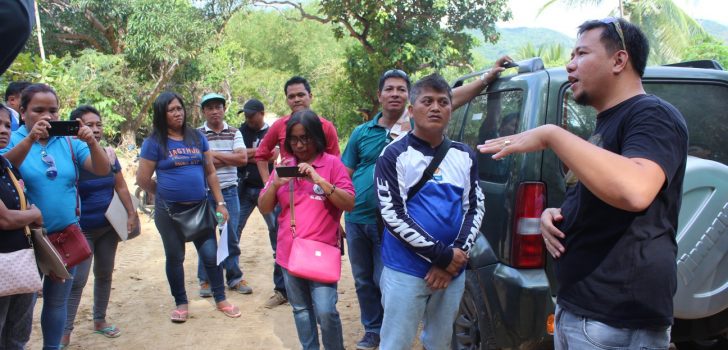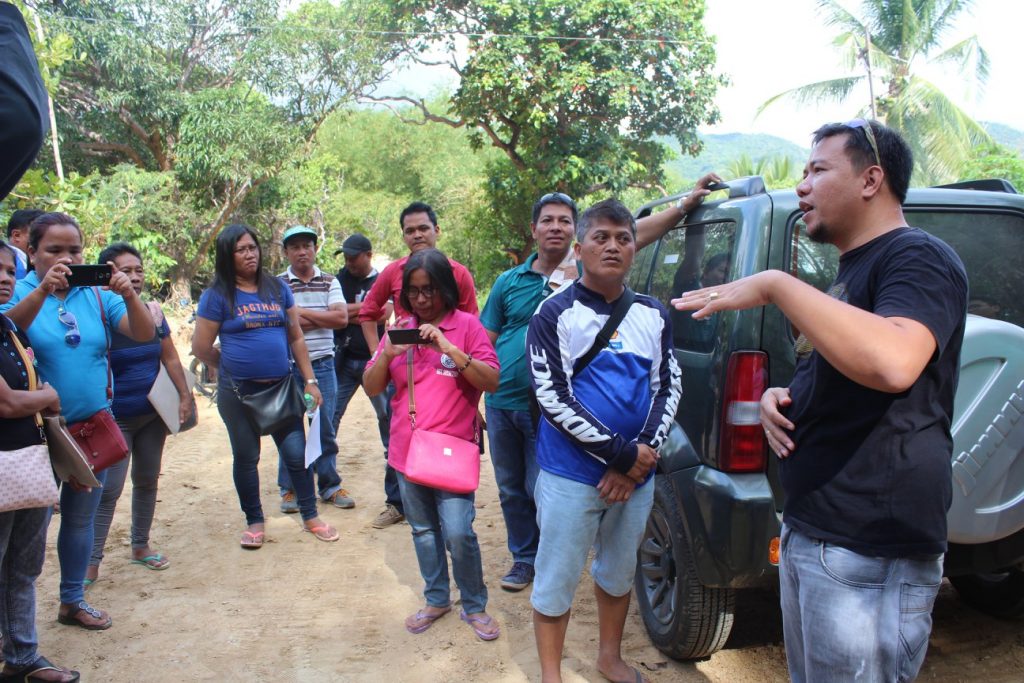 Engr. Allan Tatiera, the head of the infrastructure development component of the Department of Agriculture’s Philippine Rural Development Project of the South Luzon Cluster, joins the Citizen Monitoring Training with the beneficiaries of the Construction and Upgrading of the Nicanor Zabala-San Miguel-Jolo Farm-to-Market Road subproject. Engr. Tatiera led the training on the aspect of infrastructure standards of the Project
Engr. Allan Tatiera, the head of the infrastructure development component of the Department of Agriculture’s Philippine Rural Development Project of the South Luzon Cluster, joins the Citizen Monitoring Training with the beneficiaries of the Construction and Upgrading of the Nicanor Zabala-San Miguel-Jolo Farm-to-Market Road subproject. Engr. Tatiera led the training on the aspect of infrastructure standards of the Project Adopting PRDP’s scientific tools in effective infrastructure implementation
The 11.71-kilometer “Construction and Upgrading of the Nicanor Zabala-San Miguel-Jolo Farm-to-Market Road (FMR)” surely has come a long way since its approval to the Philippine Rural Development Project (PRDP) in 2014. Located in the Municipality of Roxas, Palawan, the subproject is now nearing completion with an estimated cost of P117.4 million.
The FMR is a form of infrastructure support to the cashew industry of the municipality and province, particularly in the input supply chain of the commodity. Before it was approved, the subproject was ensured that it will cater to address the issue on the difficulty of farmers in accessing high quality planting materials and other inputs because of the poor road condition.
This was determined using statistical data provided by the value chain analysis, expanded vulnerability and suitability assessment, and commodity investment plan on cashew. These are science-based planning tools developed by the Project to ensure that its interventions are the most appropriate in a specific area, without being redundant or a waste of government funds.
During its implementation, the Project also made sure through training and capacity buildings that its technical team and representatives from local government units (LGUs) are armed with the necessary knowledge in effectively executing their responsibilities.
One of these training was the strengthening of social and environmental monitoring, inviting various representatives from different LGUs engaged with the PRDP. This was for the purpose of discussing the importance of safeguards aspects during construction or monitoring and sharing both positive and negative experiences from different subproject implementers to gather insights in complying with safeguards requirements.
One of the good practices during the construction of the Nicanor Zabala-San Miguel-Jolo FMR was the use of the Grievance Redress Mechanism (GRM) poster to inform residents and by-passers a way of communicating their concerns to the LGU or PRDP management. A GRM box was also displayed in various public locations to ensure that beneficiaries remain to have a voice in airing out their grievances towards the implementation of their subproject.
To support this way of monitoring the construction of the FMR, the Project also implemented the use of the Citizen Monitoring Tool (CMT) which involves the participation of the members of the municipal government, the FMR’s contractor, and most importantly, the farmers, fisherfolk, and other residents who will eventually become the first members of the Barangay Inspectorate Team.
Through the CMT’s and report system, beneficiaries can easily report their findings to the municipal government as the FMR’s primary implementing unit. These findings will be based on a guide questionnaire developed to answer important questions on aspects of basic infrastructure standards and elements of quality assurance, social and environmental safeguards, and other construction matters.
An important aspect of CMT is also the use of the Applied Geotagging Tool through the PRDP Camera application where individuals can capture geotagged photos of activities happening in every stretch of the road being built. These photos come with a barcode and precise location where it was taken to ensure the real-time documentation of said activities.
Indeed, citizen monitoring gives subproject beneficiaries the opportunity to monitor and influence the timely and efficient execution of PRDP subprojects. As an advocate of full transparency, the Project relies on its tools to effectively and appropriately implement its interventions to avoid corruption. And with a good quality intervention comes a number of benefits that should contribute to the improvement of its beneficiaries’ socio-economic conditions.
The Nicanor Zabala-San Miguel-Jolo FMR is expected to be completed this 2020 and begin to provide its beneficiaries with ways and opportunities to increase their production and income. The cashew industry being one of the biggest agricultural industries in the Province of Palawan, this access road will surely be one which will contribute to farmers, traders, and ordinary residents in logistical support. ### (Leira Vic Colongon, DA-PRDP MIMAROPA RPCO InfoACE Unit)

Engr. Allan Tatiera, the head of the infrastructure development component of the Department of Agriculture’s Philippine Rural Development Project of the South Luzon Cluster, joins the Citizen Monitoring Training with the beneficiaries of the Construction and Upgrading of the Nicanor Zabala-San Miguel-Jolo Farm-to-Market Road subproject. Engr. Tatiera led the training on the aspect of infrastructure standards of the Project
